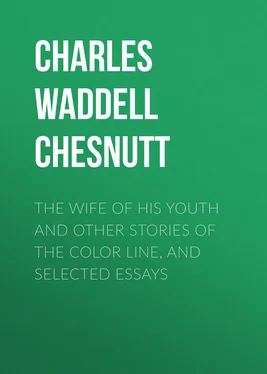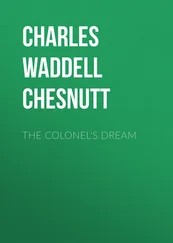Charles Waddell Chesnutt - The Wife of his Youth and Other Stories of the Color Line, and Selected Essays
Здесь есть возможность читать онлайн «Charles Waddell Chesnutt - The Wife of his Youth and Other Stories of the Color Line, and Selected Essays» — ознакомительный отрывок электронной книги совершенно бесплатно, а после прочтения отрывка купить полную версию. В некоторых случаях можно слушать аудио, скачать через торрент в формате fb2 и присутствует краткое содержание. Жанр: foreign_prose, foreign_antique, на английском языке. Описание произведения, (предисловие) а так же отзывы посетителей доступны на портале библиотеки ЛибКат.
- Название:The Wife of his Youth and Other Stories of the Color Line, and Selected Essays
- Автор:
- Жанр:
- Год:неизвестен
- ISBN:нет данных
- Рейтинг книги:5 / 5. Голосов: 1
-
Избранное:Добавить в избранное
- Отзывы:
-
Ваша оценка:
- 100
- 1
- 2
- 3
- 4
- 5
The Wife of his Youth and Other Stories of the Color Line, and Selected Essays: краткое содержание, описание и аннотация
Предлагаем к чтению аннотацию, описание, краткое содержание или предисловие (зависит от того, что написал сам автор книги «The Wife of his Youth and Other Stories of the Color Line, and Selected Essays»). Если вы не нашли необходимую информацию о книге — напишите в комментариях, мы постараемся отыскать её.
The Wife of his Youth and Other Stories of the Color Line, and Selected Essays — читать онлайн ознакомительный отрывок
Ниже представлен текст книги, разбитый по страницам. Система сохранения места последней прочитанной страницы, позволяет с удобством читать онлайн бесплатно книгу «The Wife of his Youth and Other Stories of the Color Line, and Selected Essays», без необходимости каждый раз заново искать на чём Вы остановились. Поставьте закладку, и сможете в любой момент перейти на страницу, на которой закончили чтение.
Интервал:
Закладка:
"I want to get away," said the prisoner, "and I don't want to be captured; for if I am I know I will be hung on the spot. I am afraid," he added somewhat reflectively, "that in order to save myself I shall have to kill you."
"Good God!" exclaimed the sheriff in involuntary terror; "you would not kill the man to whom you owe your own life."
"You speak more truly than you know," replied the mulatto. "I indeed owe my life to you."
The sheriff started, he was capable of surprise, even in that moment of extreme peril. "Who are you?" he asked in amazement.
"Tom, Cicely's son," returned the other. He had closed the door and stood talking to the sheriff through the grated opening. "Don't you remember Cicely—Cicely whom you sold, with her child, to the speculator on his way to Alabama?"
The sheriff did remember. He had been sorry for it many a time since. It had been the old story of debts, mortgages, and bad crops. He had quarreled with the mother. The price offered for her and her child had been unusually large, and he had yielded to the combination of anger and pecuniary stress.
"Good God!" he gasped, "you would not murder your own father?"
"My father?" replied the mulatto. "It were well enough for me to claim the relationship, but it comes with poor grace from you to ask anything by reason of it. What father's duty have you ever performed for me? Did you give me your name, or even your protection? Other white men gave their colored sons freedom and money, and sent them to the free States. You sold me to the rice swamps."
"I at least gave you the life you cling to," murmured the sheriff.
"Life?" said the prisoner, with a sarcastic laugh. "What kind of a life? You gave me your own blood, your own features,—no man need look at us together twice to see that,—and you gave me a black mother. Poor wretch! She died under the lash, because she had enough womanhood to call her soul her own. You gave me a white man's spirit, and you made me a slave, and crushed it out."
"But you are free now," said the sheriff. He had not doubted, could not doubt, the mulatto's word. He knew whose passions coursed beneath that swarthy skin and burned in the black eyes opposite his own. He saw in this mulatto what he himself might have become had not the safeguards of parental restraint and public opinion been thrown around him.
"Free to do what?" replied the mulatto. "Free in name, but despised and scorned and set aside by the people to whose race I belong far more than to my mother's."
"There are schools," said the sheriff. "You have been to school." He had noticed that the mulatto spoke more eloquently and used better language than most Branson County people.
"I have been to school, and dreamed when I went that it would work some marvelous change in my condition. But what did I learn? I learned to feel that no degree of learning or wisdom will change the color of my skin and that I shall always wear what in my own country is a badge of degradation. When I think about it seriously I do not care particularly for such a life. It is the animal in me, not the man, that flees the gallows. I owe you nothing," he went on, "and expect nothing of you; and it would be no more than justice if I should avenge upon you my mother's wrongs and my own. But still I hate to shoot you; I have never yet taken human life—for I did not kill the old captain. Will you promise to give no alarm and make no attempt to capture me until morning, if I do not shoot?"
So absorbed were the two men in their colloquy and their own tumultuous thoughts that neither of them had heard the door below move upon its hinges. Neither of them had heard a light step come stealthily up the stairs, nor seen a slender form creep along the darkening passage toward the mulatto.
The sheriff hesitated. The struggle between his love of life and his sense of duty was a terrific one. It may seem strange that a man who could sell his own child into slavery should hesitate at such a moment, when his life was trembling in the balance. But the baleful influence of human slavery poisoned the very fountains of life, and created new standards of right. The sheriff was conscientious; his conscience had merely been warped by his environment. Let no one ask what his answer would have been; he was spared the necessity of a decision.
"Stop," said the mulatto, "you need not promise. I could not trust you if you did. It is your life for mine; there is but one safe way for me; you must die."
He raised his arm to fire, when there was a flash—a report from the passage behind him. His arm fell heavily at his side, and the pistol dropped at his feet.
The sheriff recovered first from his surprise, and throwing open the door secured the fallen weapon. Then seizing the prisoner he thrust him into the cell and locked the door upon him; after which he turned to Polly, who leaned half-fainting against the wall, her hands clasped over her heart.
"Oh, father, I was just in time!" she cried hysterically, and, wildly sobbing, threw herself into her father's arms.
"I watched until they all went away," she said. "I heard the shot from the woods and I saw you shoot. Then when you did not come out I feared something had happened, that perhaps you had been wounded. I got out the other pistol and ran over here. When I found the door open, I knew something was wrong, and when I heard voices I crept upstairs, and reached the top just in time to hear him say he would kill you. Oh, it was a narrow escape!"
When she had grown somewhat calmer, the sheriff left her standing there and went back into the cell. The prisoner's arm was bleeding from a flesh wound. His bravado had given place to a stony apathy. There was no sign in his face of fear or disappointment or feeling of any kind. The sheriff sent Polly to the house for cloth, and bound up the prisoner's wound with a rude skill acquired during his army life.
"I 'll have a doctor come and dress the wound in the morning," he said to the prisoner. "It will do very well until then, if you will keep quiet. If the doctor asks you how the wound was caused, you can say that you were struck by the bullet fired from the woods. It would do you no good to have it known that you were shot while attempting to escape."
The prisoner uttered no word of thanks or apology, but sat in sullen silence. When the wounded arm had been bandaged, Polly and her father returned to the house.
The sheriff was in an unusually thoughtful mood that evening. He put salt in his coffee at supper, and poured vinegar over his pancakes. To many of Polly's questions he returned random answers. When he had gone to bed he lay awake for several hours.
In the silent watches of the night, when he was alone with God, there came into his mind a flood of unaccustomed thoughts. An hour or two before, standing face to face with death, he had experienced a sensation similar to that which drowning men are said to feel—a kind of clarifying of the moral faculty, in which the veil of the flesh, with its obscuring passions and prejudices, is pushed aside for a moment, and all the acts of one's life stand out, in the clear light of truth, in their correct proportions and relations,—a state of mind in which one sees himself as God may be supposed to see him. In the reaction following his rescue, this feeling had given place for a time to far different emotions. But now, in the silence of midnight, something of this clearness of spirit returned to the sheriff. He saw that he had owed some duty to this son of his,—that neither law nor custom could destroy a responsibility inherent in the nature of mankind. He could not thus, in the eyes of God at least, shake off the consequences of his sin. Had he never sinned, this wayward spirit would never have come back from the vanished past to haunt him. As these thoughts came, his anger against the mulatto died away, and in its place there sprang up a great pity. The hand of parental authority might have restrained the passions he had seen burning in the prisoner's eyes when the desperate man spoke the words which had seemed to doom his father to death. The sheriff felt that he might have saved this fiery spirit from the slough of slavery; that he might have sent him to the free North, and given him there, or in some other land, an opportunity to turn to usefulness and honorable pursuits the talents that had run to crime, perhaps to madness; he might, still less, have given this son of his the poor simulacrum of liberty which men of his caste could possess in a slave-holding community; or least of all, but still something, he might have kept the boy on the plantation, where the burdens of slavery would have fallen lightly upon him.
Читать дальшеИнтервал:
Закладка:
Похожие книги на «The Wife of his Youth and Other Stories of the Color Line, and Selected Essays»
Представляем Вашему вниманию похожие книги на «The Wife of his Youth and Other Stories of the Color Line, and Selected Essays» списком для выбора. Мы отобрали схожую по названию и смыслу литературу в надежде предоставить читателям больше вариантов отыскать новые, интересные, ещё непрочитанные произведения.
Обсуждение, отзывы о книге «The Wife of his Youth and Other Stories of the Color Line, and Selected Essays» и просто собственные мнения читателей. Оставьте ваши комментарии, напишите, что Вы думаете о произведении, его смысле или главных героях. Укажите что конкретно понравилось, а что нет, и почему Вы так считаете.












